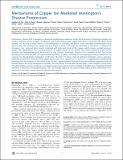| dc.contributor.author | Fox, Jonathan H. | |
| dc.contributor.author | Kama, Jibrin A. | |
| dc.contributor.author | Lieberman, Gregory | |
| dc.contributor.author | Chopra, Raman | |
| dc.contributor.author | Dorsey, Kate | |
| dc.contributor.author | Volitakis, Irene | |
| dc.contributor.author | Cherny, Robert A. | |
| dc.contributor.author | Chopra, Vanita | |
| dc.contributor.author | Bush, Ashley Ian | |
| dc.contributor.author | Hersch, Steven M. | |
| dc.date.accessioned | 2011-02-20T21:31:44Z | |
| dc.date.issued | 2007 | |
| dc.identifier.citation | Fox, Jonathan H., Jibrin A. Kama, Gregory Lieberman, Raman Chopra, Kate Dorsey, Vanita Chopra, Irene Volitakis, Robert A. Cherny, Ashley I. Bush, and Steven Hersch. 2007. Mechanisms of copper ion mediated Huntington's disease progression. PLoS ONE 2(3): e334. | en_US |
| dc.identifier.issn | 1932-6203 | en_US |
| dc.identifier.uri | http://nrs.harvard.edu/urn-3:HUL.InstRepos:4728501 | |
| dc.description.abstract | Huntington's disease (HD) is caused by a dominant polyglutamine expansion within the N-terminus of huntingtin protein and results in oxidative stress, energetic insufficiency and striatal degeneration. Copper and iron are increased in the striata of HD patients, but the role of these metals in HD pathogenesis is unknown. We found, using inductively-coupled-plasma mass spectroscopy, that elevations of copper and iron found in human HD brain are reiterated in the brains of affected HD transgenic mice. Increased brain copper correlated with decreased levels of the copper export protein, amyloid precursor protein. We hypothesized that increased amounts of copper bound to low affinity sites could contribute to pro-oxidant activities and neurodegeneration. We focused on two proteins: huntingtin, because of its centrality to HD, and lactate dehydrogenase (LDH), because of its documented sensitivity to copper, necessity for normoxic brain energy metabolism and evidence for altered lactate metabolism in HD brain. The first 171 amino acids of wild-type huntingtin, and its glutamine expanded mutant form, interacted with copper, but not iron. N171 reduced Cu2+ in vitro in a 1∶1 copper∶protein stoichiometry indicating that this fragment is very redox active. Further, copper promoted and metal chelation inhibited aggregation of cell-free huntingtin. We found decreased LDH activity, but not protein, and increased lactate levels in HD transgenic mouse brain. The LDH inhibitor oxamate resulted in neurodegeneration when delivered intra-striatially to healthy mice, indicating that LDH inhibition is relevant to neurodegeneration in HD. Our findings support a role of pro-oxidant copper-protein interactions in HD progression and offer a novel target for pharmacotherapeutics. | en_US |
| dc.language.iso | en_US | en_US |
| dc.publisher | Public Library of Science | en_US |
| dc.relation.isversionof | doi:10.1371/journal.pone.0000334 | en_US |
| dc.relation.hasversion | http://www.ncbi.nlm.nih.gov/pmc/articles/PMC1828629/pdf/ | en_US |
| dash.license | LAA | |
| dc.title | Mechanisms of Copper Ion Mediated Huntington's Disease Progression | en_US |
| dc.type | Journal Article | en_US |
| dc.description.version | Version of Record | en_US |
| dc.relation.journal | PLoS ONE | en_US |
| dash.depositing.author | Bush, Ashley Ian | |
| dc.date.available | 2011-02-20T21:31:44Z | |
| dash.affiliation.other | HMS^Psychiatry-Massachusetts General Hospital | en_US |
| dash.affiliation.other | HMS^Neurology-Massachusetts General Hospital | en_US |
| dc.identifier.doi | 10.1371/journal.pone.0000334 | * |
| dash.authorsordered | false | |
| dash.contributor.affiliated | Chopra, Vanita | |
| dash.contributor.affiliated | Hersch, Steven | |
| dash.contributor.affiliated | Bush, A | |


